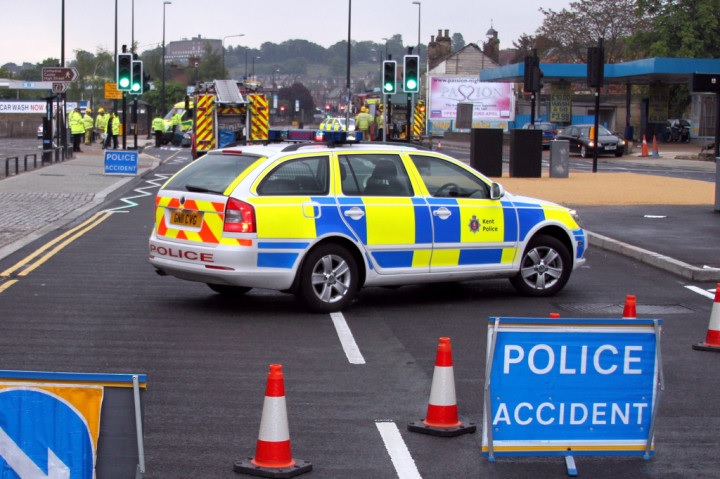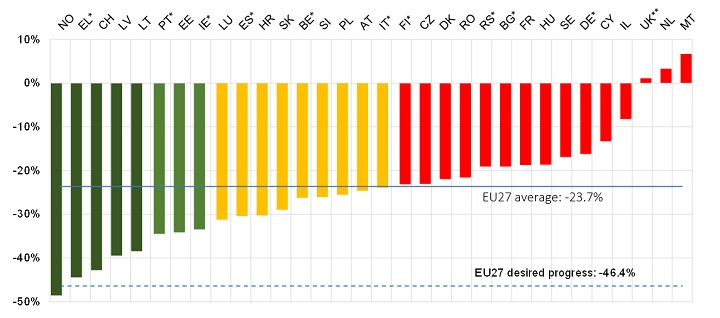
While remaining ‘relatively safe’ in comparison to other European countries, a new report has highlighted the ‘disappointing progress’ made by the UK in reducing casualties since 2010.
The 14th Road Safety Performance Index Report, produced by the European Transport Safety Council (ETSC), compares statistics from 32 European countries – including the 27 EU member states.
It shows that of the countries monitored, 16 recorded a year-on-year fall in road deaths in 2019 – with the ‘best results’ achieved by Luxembourg (39%), Sweden (32%) and Estonia (22%).
Looking at longer term trends, the report states that the EU, and its member states, will ‘almost certainly’ miss their target to cut road deaths by half in the decade to 2020.
It highlights that since 2010, EU countries achieved an overall reduction in road deaths of 24%, which equates to a 2.7% annual average reduction
Meanwhile over that period, the UK* – described as one of Europe’s traditional leaders on road safety – is one of three countries where road fatalities have actually increased (by 1.1%), along with the Netherlands (3.3%) and Malta (6.7%).

However, at 29 road deaths per million inhabitants – the UK remains one of the safest European countries, behind Norway (20), Sweden (22) and Switzerland (22).
The 2020 ETSC Road Safety Performance Index (PIN) Award – which recognises a nation that has demonstrated ‘continued progress on road safety’ – has been awarded to Estonia, in recognition of its 22% year-on-year reduction in fatalities.
Antonio Avenoso, executive director of the ETSC, said: “While progress across Europe has disappointed over the last nine years, some countries have been quietly undergoing a road safety revolution.
“We’re delighted to award Estonia this year for its remarkable progress, following Ireland’s win in 2019.”
Looking forward, the ETSC says it expects a ‘significant drop’ in road deaths in 2020, as a result of Covid-19 lockdown policies.
It also predicts road safety in the EU is ‘likely to see a boost’ over the next decade – thanks to new legislation on minimum vehicle and infrastructure safety standards agreed last year.
Despite this, it calls on countries to ‘step up a gear’ to hit the new target to halve road deaths by 2030.
Antonio Avenoso added: “The recent response to the Covid-19 epidemic may signal a way forward.
“A dramatic shift to walking and cycling in urban areas, combined with infrastructure changes and lower speed limits, could have a massive impact on road death and injury. But if we just revert to business-as-usual after this crisis, the results could be even worse than before.
“There are danger signs already in the large numbers of speeding offences being reported as lockdowns are lifted, which only adds to the work of overstretched police and emergency services.”
*The UK’s 2019 estimate is based on the Great Britain provisional total for the year ending June 2019 – and the final 2019 data for Northern Ireland.
In 2008 the Commons Select Committee on Transport published a report :-
“Ending the Scandal of Complacency: Road Safety Beyond 2020”
Since then we have had minister after minister preceding almost all comments with the announcement that we have “some of the safest roads in the world” as if that exonerates having some roads where people fear for their lives to the extent that their choices of mobility are limited to either a motor vehicle or a mode that adds danger beyond what an inclusive society should allow.
There is probably no better example of the “complacency” that still lingers.
And now we are in a position whereby our fatalities are worse than 2010.
Our government cuts back on road policing and education. It creates obstacles for automatic speed control technologies, it panders to the motoring lobby. And when organisations attempt to regularise lower speeds through lower limits it uses its failure to have an effective police force, or streamlined technology, or adequate engagement and education as a reason why they should not be implemented on a national scale.
We are now a dozen years on from the publishing of the report to “end the scandal” yet the scandal still exists and the consequences of the scandal maim and kill and prevent active travel and put fear into communities across our land.
You can see our views on the government’s response to NHS doctors calling for an emergency national default 20mph urban limit at http://www.20splenty.org/gov_comms_2020
And you can register for the free Landor Webinar on “Managing Road Danger and Speed: Implementing 20mph limits” at http://www.20splenty.org/webinar_25-6-20
We are in difficult times. And we all know the spectre of Covid-19 hanging across our communities. But we also know that road fatalities and casualties are predictable and preventable.
Its time to demand that the complacency ends.
Rod King, Lymm
--2
Pat, I respectfully disagree with the ideas of diminishing marginal returns in casualty reduction and that “good performers” find it hard to significantly improve. In business, the best performing companies learn and invest the most to achieve ongoing performance improvements. Or they would go bust! This applies to all organisations and sectors including public services.
The sad reality is that since 2010 the UK has not had the desire, leadership or coherent planning to make real progress. Other countries – admittedly because it is a novel policy area or they have worse problems – have been showing the way.
The UK is starting from a good place and the road safety community does many things well – but the UK government’s approach is unambitious, piecemeal and complacent. As a result, we are slipping down the performance table when we could do so much better.
David Davies
--1
Being ‘relatively safe’ and making ‘disappointing progress’ as the article says is only to be expected by the age-old law of “diminishing returns”. If you then couple that with less active and visible enforcement due to a drop in the number of front line roads police officers and less money available for road safety and the outcome is no surprise.
Actually, in my view, road safety does surprising well in spite of all the hurdles of underfunding, under-resourcing, diluted policies and the myriad of “other duties” RSOs often have had added to their roles in recent years.
Pat, Wales
+6